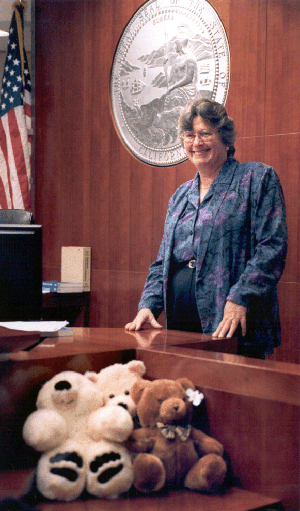|
 When
a child has to testify or meet with a San Francisco family law judge
in chambers, he or she receives a teddy bear to hold and to take home.
Adolescents considered delinquents because of assaults on family
members are served in a special youth domestic violence court. Parents
involved in dependency proceedings are trained to act as mediators.
Grant money will fund a case manager for the court to help families
who experience violence to gain better access to services. When
a child has to testify or meet with a San Francisco family law judge
in chambers, he or she receives a teddy bear to hold and to take home.
Adolescents considered delinquents because of assaults on family
members are served in a special youth domestic violence court. Parents
involved in dependency proceedings are trained to act as mediators.
Grant money will fund a case manager for the court to help families
who experience violence to gain better access to services.
Each of these innovations, and literally dozens
of others, are either the brainchild or the product of the energy of
Judge Donna J. Hitchens, who presides over San Francisco's unified
family court, one of only two such courts in the state.
In recognition of her untiring efforts to improve
access to the courts for low and moderate income persons, Hitchens
received the Benjamin Aranda III Access to Justice Award. The honor
recognizes a judge who has demonstrated a long-term commitment to
equal access to the judicial system and who has personally done
significant work to improve that access.
A quick look at Hitchens' accomplishments in
the decade since she joined the bench in 1991 demonstrates why she won
the award:
 She worked closely with the Child Trauma Research Project and the
University of California San Francisco forensic psychiatry program to
make available to families in the juvenile court reasonably priced
neutral custody evaluations.
She worked closely with the Child Trauma Research Project and the
University of California San Francisco forensic psychiatry program to
make available to families in the juvenile court reasonably priced
neutral custody evaluations.
 She worked with a local lawyer referral service to establish a
mandatory training program for attorneys wishing to practice in
juvenile court and a peer review procedure to ensure the competency of
court-appointed attorneys.
She worked with a local lawyer referral service to establish a
mandatory training program for attorneys wishing to practice in
juvenile court and a peer review procedure to ensure the competency of
court-appointed attorneys.
 She created a committee to coordinate the youth services offered by
numerous agencies.
She created a committee to coordinate the youth services offered by
numerous agencies.
 She established a separate adoption review calendar to ensure that
children are adopted quickly.
She established a separate adoption review calendar to ensure that
children are adopted quickly.
 She received a grant from the Administrative Office of the Courts for
a project to evaluate how dependency cases could be handled more
efficiently and how to eliminate undue delays in getting children to
stable homes.
She received a grant from the Administrative Office of the Courts for
a project to evaluate how dependency cases could be handled more
efficiently and how to eliminate undue delays in getting children to
stable homes.
"Donna is all about the clients and the people
she's serving," says Tanya Neiman, director of the volunteer legal
services program of the Bar Association of San Francisco. "She cares
about justice, she cares about fairness, she cares about enhancing pro
bono participation."
The achievement of which she is proudest, says
Hitchens, is the unification of the family court, which brings under
one jurisdiction dependency, delinquency and domestic relations.
"What I've really tried to do is change the focus from the
traditional view as strictly adjudicatory to public service," she
said. "We're really trying to help families and children instead
of making decisions for them because they can't."
Hitchens began her stint in the juvenile court
division in 1995 and two years later created the unified family court,
which brought together the proceedings of three divisions. The court
provides a holistic approach to families, with an eye to integrating
the wide range of services available to parents and children as well
as making those services more accessible.
Hitchens attributes her success to building
collaborative relationships among the local bar, attorneys, community
based organizations and service providers "to work together instead
of against each other.
"It's a pretty unusual approach," she
added, "and I think we've made enormous headway."
Hitchens has introduced numerous programs into
the family court. One project produced a comprehensive manual on
services available from public agencies. A collaborative law court
encourages the use of a non-adversarial environment in family law,
where specially trained attorneys focus on the needs of children and
agree not to represent clients if normal litigation is required.
"Family Matters" is a newsletter for professionals from all fields
who interact with the family court. Petitioners can file domestic
violence orders through the internet. Another project works to insure
that the special education needs of foster children are met by the
school district.
Hitchens practiced civil rights law before her
election to the court in 1990, handling mostly employment
discrimination and constitutional cases. She founded the National
Center for Lesbian Rights.
With Nancy Davis, her partner of 25 years, she
adopted two daughters, now 16 and 19, a move she describes as "the
best decision I ever made in my life." |

